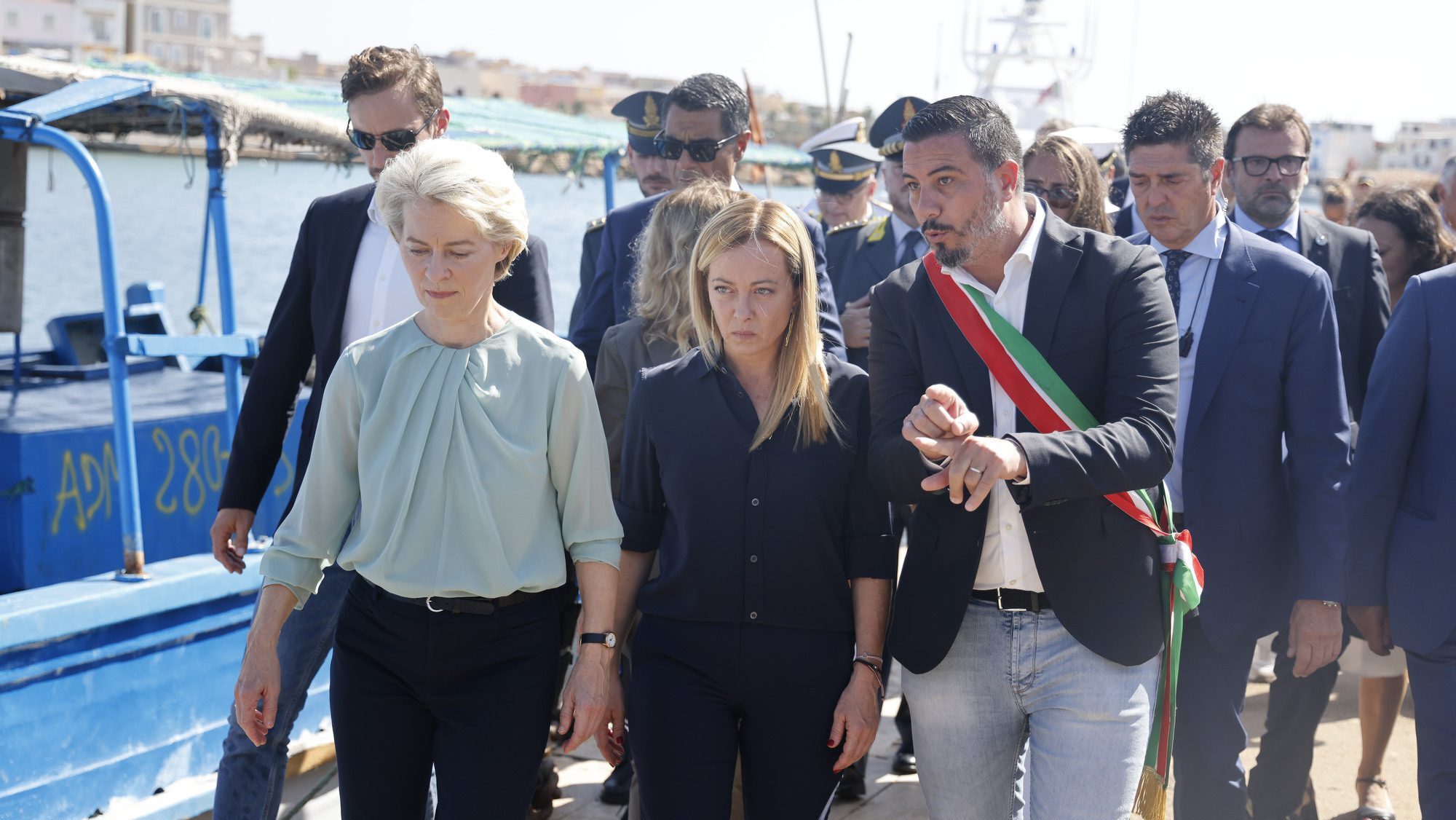
Left to right: EC President Ursula von der Leyen, Italian PM Giorgia Meloni, and Lampedusa Deputy Mayor Attilio Lucia
Photo: Ursula von der Leyen / X
“A European challenge needs a European answer,” EU Commission President Ursula von der Leyen said in a joint press conference with Italian Prime Minister Giorgia Meloni on Sunday, September 17th, during the duo’s surprise visit to the Mediterranean island of Lampedusa, overwhelmed by thousands of illegal arrivals in recent weeks. The Commission’s chief announced her ten-point action plan to counter the crisis, which includes ramping up deportations, cracking down on traffickers, and relying on the solidarity of the entire EU.
PM Meloni, thanking the Commission chief at the airport for delaying her departure for the UN General Assembly in New York just to visit the island, said she did not consider it so much “as a gesture of solidarity towards Italy, but a gesture of responsibility of Europe towards itself.” The PM then added:
At stake here is the future that Europe wants to give itself: the future depends on Europe’s ability to deal with the great epochal challenges!
However, upon arriving in the small town of around six thousand inhabitants, Von der Leyen and Meloni were welcomed by a roadblock put up by a thousand angry locals who had been demonstrating for the removal of the migrant reception center since the “invasion” last Tuesday, which saw 110 boats (carrying over 5,000 migrants) land on the island in a single day.
Instead of ignoring the sentiments, Meloni decided to engage the protesters, asking them about their problems and promising swift actions and a further €50 million for the island, which seemed to calm everyone’s nerves. The protestors thanked Meloni and quickly removed the roadblock so that the convoy could reach the overcrowded harbor and reception center.
During their press conference, the prime minister focused on immediate, radical solutions, such as the idea of a European naval blockade off the coasts of Africa to prevent traffickers from entering international waters.
“We will never solve the problem by talking about redistribution. The only way to seriously tackle the problem is to stop illegal departures,” Meloni said, calling for an “effective European naval mission” to counter traffickers as soon as they launch. She also called for greater EU and UN involvement because:
If anyone in Europe thinks this issue will simply be resolved within the borders of Italy, they are mistaken.
Furthermore, Meloni announced that she is giving the mandate to the Ministry of Defense to extend the detention period for illegal migrants up to the maximum allowed under EU rules in order to make deportations more effective.
In turn, the Commission chief began her speech by reminding the press that everyone involved—locals, authorities, and the migrants themselves—are equally victims of a situation “which is not of their making.” Nonetheless, she reassured the audience that Europe stands with Italy to the fullest. Von der Leyen stressed:
I want to be very clear. We have an obligation as part of the international community. We have fulfilled it in the past, and we will do so today and in the future.
But we will decide who comes to the European Union and under what circumstances, and not the smugglers and traffickers. … Those who do not have the right cannot remain.
It is very important for me to be in Lampedusa today.
— Ursula von der Leyen (@vonderleyen) September 17, 2023
I'm here to offer a coordinated response by the Italian and European authorities.
I would like to present to you a 10 point action plan ↓ https://t.co/p1KorMPEh4
Von der Leyen presented a ten-point action plan to solve the crisis. Although the plan seems ambitious, it is worth noting that her language was careful enough not to promise anything that Europe won’t necessarily commit to, such as Meloni’s naval blockade proposal, which is a possibility Von der Leyen was ready to only “explore.”
Furthermore, the Commission chief’s plan relies on member states taking in refugees under the ‘voluntary solidarity’ mechanism, which is ironic given that Von der Leyen’s own country, Germany, just announced the suspension of its participation and closed its doors to Italy. Other countries are not better either, as only a fraction of the pledged repatriations have been carried out under the plan in recent years.
Nonetheless, there are some promising points, such as promptly rejecting unfounded asylum claims, ramping up deportations to the countries of origin, and disrupting trafficking operations by targeting the smuggler’s logistical support.
Von der Leyen’s ten-point plan is summarized as:
1. Provide support from the European Commission, EU Asylum Agency, and Frontex to Italy for immediate crisis management and assistance with migrant registration.
2. Increase support for transferring migrants out of Lampedusa and encourage other member states to use the Voluntary Solidarity Mechanism.
3. Offer Frontex support for swift migrant returns to their countries of origin if they don’t qualify for asylum, along with diplomatic outreach to facilitate the process.
4. Enhance efforts to combat smugglers by collaborating with countries of origin and transit, including joint actions by Frontex and Europol, and updating anti-smuggling legislation.
5. Increase sea and aerial surveillance through Frontex, explore naval mission expansion, and expedite equipment supply to the Tunisian coastguard.
6. Take action against smugglers’ logistics and work with Italian authorities to remove and destroy recovered boats and dinghies.
7. Support Italy in applying swift asylum procedures through the EU Asylum Agency and promptly reject unfounded applications.
8. Promote legal pathways and humanitarian corridors to provide migrants with alternatives, countering smugglers’ narratives and reinforcing stricter policies on irregular migration.
9. Strengthen cooperation with UNHCR and IOM for migrant protection along the route and facilitate assisted voluntary returns.
10. Collaborate with Tunisia to implement the MoU, accelerating new projects and fund disbursement.
